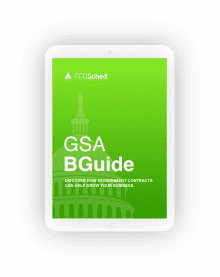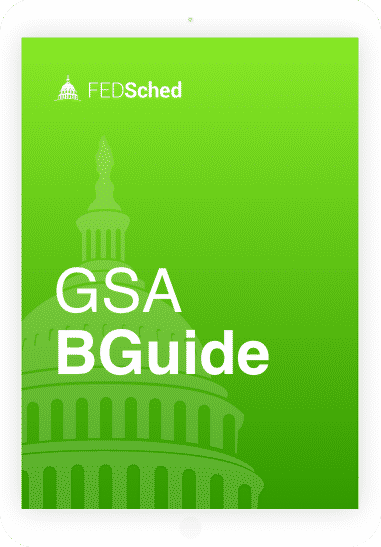We talk to companies every day who are trying to determine if they should get a GSA Schedule. The answer is really dependent on three key questions: 1) Do you Qualify, 2) Would You Benefit, and 3) Are you Ready. We highlight these questions in our GSA Schedule Assessment post, which you can review here.
In this post, we take an expanded look at the question of, would you benefit. In our experience, the six scenarios detailed below are indicators your company could potentially benefit from getting a GSA Schedule Contract.
❶ Your target customer agencies frequently use the GSA Schedule
As a government contractor, you want to be able to offer your customers the ability to purchase from you using their preferred procurement method. Many government buyers are partial to the GSA Schedule because, in addition to a streamlined ordering process, the contract has pre-negotiated pricing, terms, and conditions.
There are a few ways you can find out if your target customers are using the GSA Schedule. If you are unable to ask your target customers directly, online market research tools like sam.gov and USASpending.gov allow you to search contract awards by agency. You can also review procurement forecasts to evaluate upcoming opportunities or an agency’s “doing business” page to determine how they buy and what procurement methods they typically use.
Traditionally, the Department of Defense spends the most through the GSA Schedule, even though their GSA Schedule spending represents a small percentage of their total spending. Some agencies like the National Archives and Records Administration, use the GSA Schedule for nearly half of their contract awards. In fiscal year 2021, the FBI awarded approximately 30% of their contracts through the GSA Schedule.
❷ There is a high demand for what you offer on the GSA Schedule
The GSA Schedule is broken down into Large Categories, Subcategories, and at the most detailed level, Special Item Numbers (SINs). You can explore the categories and SINs on our website here or on GSA’s eLibrary website. Once you’ve identified the SINs applicable to your product or service offering, use GSA’s tool, the Schedule Sales Query Plus (SSQ+) to assess sales.
GSA is constantly evolving the GSA Schedule Contract to meet the needs of a growing market by adding and modifying SINs. If GSA introduces a new SIN, it’s most likely because they’ve identified a demand based on market research and feedback from government buyers. With this in mind, be on the alert for SIN additions and changes.
Market research revealed a gap in NAICS code coverage that led to the creation of the Office Administrative Services SIN 561110. GSA worked very closely with the National Archives and Records Administration (NARA) to create the Electronic Records Management Solutions SIN to meet agency needs. GSA also collaborated with the Defense Health Agency to create the Health IT SIN, and the Department of Homeland Security (DHS) to establish the Highly Adaptive Cybersecurity Services (HACS) SIN and the Continuous Diagnostics and Mitigation (CDM) SIN.
In each of the cases above, GSA identified a need for a dedicated SIN to better connect government buyers with companies that offer the solutions buyers need. While sales can take a year or two to ramp up, all of the new SINs mentioned here have experienced steady growth since their launch.
❸ You’re missing opportunities that are going through the GSA Schedule
One advantage of holding a GSA Schedule is having access to eBuy, a Request for Quote (RFQ) system. When a government buyer issues an RFQ through eBuy, they are not required to post on SAM.gov or anywhere else. Some high profile GSA Schedule opportunities, such as the upcoming EVSE and Cloud Blanket Purchase Agreements (BPAs), are publicly announced outside of eBuy. In many cases though, there is not typically enough advanced notice to obtain a GSA Schedule in time to compete for the opportunity.
While you can’t view eBuy opportunities without holding a GSA Schedule, you can use SSQ+ to review sales reported under the GSA Schedule Contract. You can also review procurement forecasts to gauge upcoming opportunities and anticipated procurement methods.
When reviewing sales data on SSQ+, make sure to also look at the total number of companies reporting sales. The IT and Professional Services Large Categories typically account for the highest sales under the GSA Schedule. While the Transportation/Logistics Services and Human Capital Large Categories report the lowest total sales, their average sales per contractor rank within the top 5.
❹ Your competitors are on the GSA Schedule and winning business
If your competitors are on the GSA Schedule and doing well in terms of sales, that is a clear indicator your company could benefit from getting a GSA Schedule. You can easily search GSA’s eLibrary website to find out if your competitors hold a GSA Schedule Contract and determine what SINs they’re conducting business under. If your competitors do hold a GSA Schedule, you can then use SSQ+ to review their reported sales to help you better determine if getting a GSA Schedule is the right move for your company.
❺ You’ve been serving as a subcontractor and are ready to take the next step
Subcontracting can be an effective way to gain government contract experience. Once you have that experience under you belt, getting a GSA Schedule can help you take the next step towards becoming a prime contractor.
A GSA Schedule provides your government customers with a contract vehicle they can use to purchase directly from you using simplified ordering procedures. A GSA Schedule also offers your buyers the benefits of a contract that:
- Contains pricing negotiated by GSA and determined “fair and reasonable”
- Meets all applicable regulations and competition requirements
- Does not require a synopsis posting on SAM.gov (formerly FBO)
- Qualifies as a Tier 2 solution for government-wide category management goals, and in some cases a Best-in-Class (BIC) solution
- Has no order limitations
❻ Your customers are requesting you get a GSA Schedule
A government buyer requesting that your company get a GSA Schedule is arguably one of the strongest indicators your company would benefit from obtaining the contract. However, there are a few additional questions to consider.
Is your government buyer looking to use the GSA Schedule for a one-time contract opportunity or will it be the preferred contract vehicle moving forward? If it’s for a one-time opportunity, is the dollar value worth the time and effort needed to obtain and manage a GSA Schedule Contract? Does market research indicate a potential for additional sales outside of the specific opportunity? Make sure to factor these questions into your ultimate decision.
Ready to Get a GSA Schedule?
With the proper research, a GSA Schedule Contract combined with a strong sales and marketing plan can serve as a valuable tool to facilitate government sales. Our team here at FEDSched has been helping companies obtain their GSA Schedule Contracts since 1986. Learn more about the GSA Schedule and proposal process here or contact us to discuss how we can help your company with the process.


